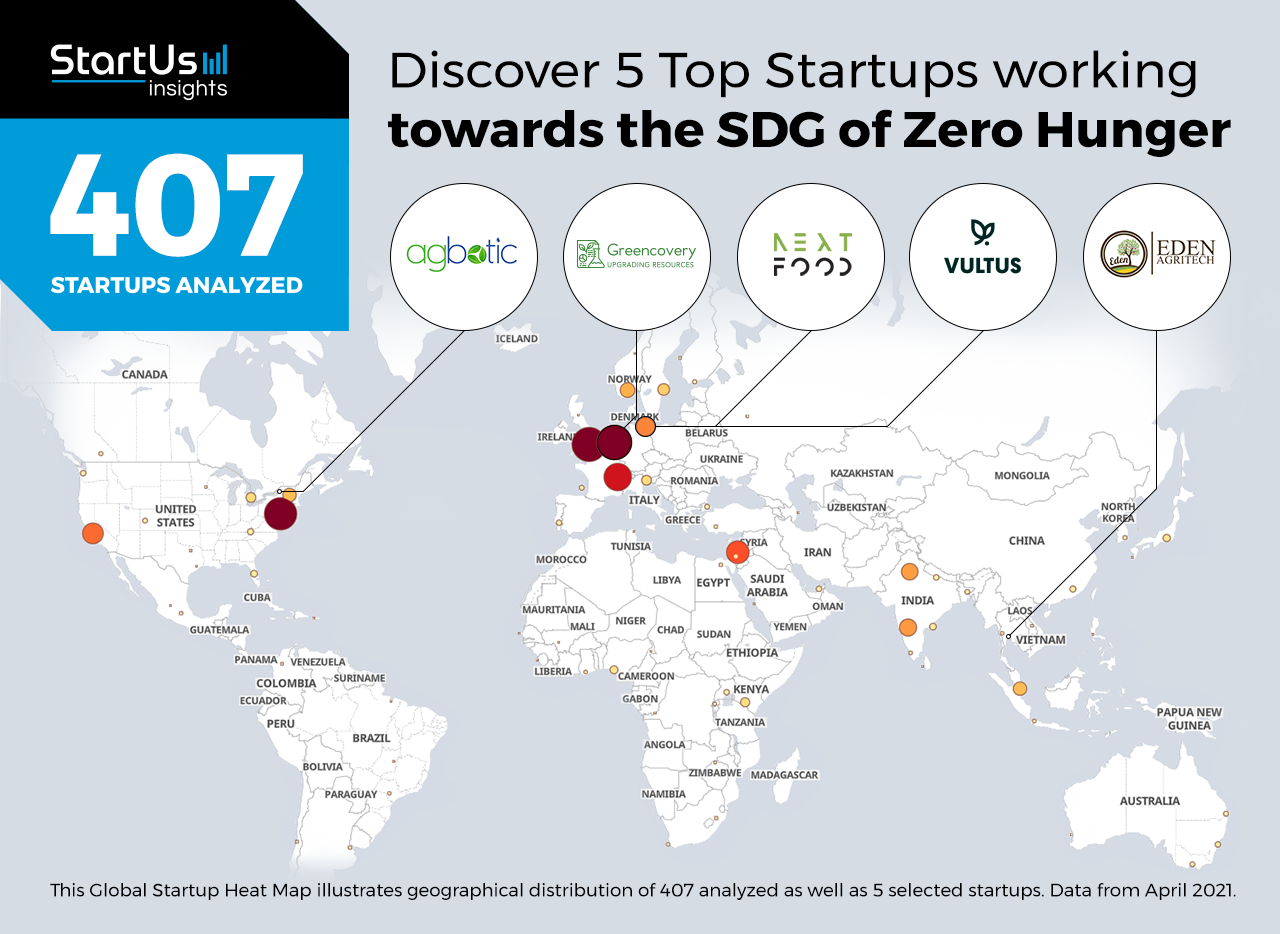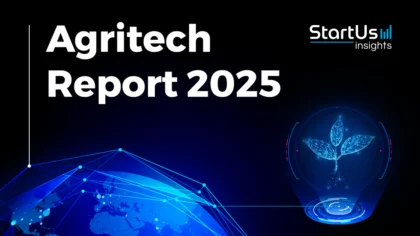Staying ahead of the technology curve means strengthening your competitive advantage. That is why we give you data-driven innovation insights into the agricultural & food industry. This time, you get to discover 5 hand-picked startups working towards the UN’s Social Development Goal #2 – Zero Hunger.
Global Startup Heat Map highlights 5 Top Zero Hunger Solutions out of 407
The insights of this data-driven analysis are derived from the Big Data & Artificial Intelligence-powered StartUs Insights Discovery Platform, covering 1.379.000+ startups & scaleups globally. The platform gives you an exhaustive overview of emerging technologies & relevant startups within a specific field in just a few clicks.
The Global Startup Heat Map below reveals the distribution of the 407 exemplary startups & scaleups we analyzed for this research. Further, it highlights 5 startups that we hand-picked based on criteria such as founding year, location, funding raised, and more. You get to explore the solutions of these 5 startups & scaleups in this report. For insights on the other 402 zero hunger solutions, get in touch.
Eden Agritech enables Shelf-Life Extension to Fight Food Waste
Large amounts of food produced annually are wasted while in supply chains or storage. This contributes to food poverty, as well as avoidable greenhouse gas (GHG) emissions. This is why food & agriculture startups are developing new strategies to extend the shelf-life of food products. For instance, innovative coating materials slow down the enzymatic degradation of fresh produce.
Thai startup Eden Agritech creates natural ingredients that enable the shelf-life extension. The startup develops an anti-fouling coating that extends the shelf life of fresh produce by up to three times. The coating prevents oxidation and, thereby, browning of fruits, as well as microbial growth. Maintaining the quality of fresh produce longer reduces waste and spoilage along the agricultural supply chain.
Greencovery provides Circular Ingredients from Side Streams
Agricultural and food waste hurts the food security of economies globally. Often, waste from one food processing unit may have critical ingredients for a different food processing unit. Circular economy solutions redirect food waste into the production of other food items. Moreover, these solutions also reduce the cost of food processing, making food more accessible and affordable to a wider population.
Greencovery is a Dutch startup that upcycles valuable ingredients from food side streams. The startup’s technology helps food manufacturers and distributors discover new sources of sustainable ingredients. The company develops the processes necessary to recover ingredients from the food stream. Lastly, it also helps companies scale up the production of the ingredients.
Vultus uses Precision Farming to Generate Higher Yields
Increasing farming yield is critical to feeding a growing population without further deforestation for agricultural land. This is where precision farming solutions come in. Combining data from sensors and aerial or satellite images, these solutions determine the exact amount of inputs required for each unit square. In addition to increasing yield, this makes farming more sustainable and profitable by reducing unnecessary usage of agrochemicals.
Swedish startup Vultus develops satellite solutions for precision farming. By analyzing satellite images, the startup determines the exact fertilizer needs for any farm. It also detects threats such as pests weeks before the symptoms are visible to the naked eye. Additionally, the startup provides insights on plant health, water stress, and weather patterns, as well as intra-field performance over periods ranging from weeks to years.
Agbotic builds Smart Farms to enable Resilient and Sustainable Farming
AgriTech and food startups are rapidly incorporating information technologies to increase yield and automate production. Some of these technologies include the Internet of Things (IoT) sensors, computer vision, and advanced robotics. Smart farms, for example, leverage technology to grow more food while reducing the environmental impact. As climate change impacts yields from traditional farms, smart farms are critical to meet the UN’s zero hunger SDG.
US-based startup Agbotic develops technology for smart farms. The startup’s SmartFarm platform combines ecology and technology to enable resilient and sustainable farming. It promotes regenerative farming by strategic tree planting, crop rotation, carbon sequestration, and habitat restoration. The startup also utilizes automation and advanced analytics to enable improvements in crop quality and yield while minimizing resource use.
Nextfood offers Automated Vertical Farming
Urban farming solutions help cities become self-reliant and achieve zero-hunger goals. However, as the land cost is at a premium in cities, traditional farming practices that require large tracts of land are ruled out. This is why AgriTech startups offer vertical farming solutions to produce food at scale, even in limited space.
Nextfood is a Danish startup that provides automated vertical farming solutions. The startup’s autonomous grow system simplifies growing high-quality plants, as well as makes it more predictable. The startup’s solution uses soilless aeroponics to allow growers to precisely control inputs, as well as save water and fertilizers. This presents a sustainable and scalable method to fight hunger in urban settings.
Discover more AgTech & Food Startups
Startups such as the examples highlighted in this report focus on artificial proteins, gene editing, as well as optimized irrigation. While all of these technologies play a major role in advancing the UN’s goal of Zero Hunger, they only represent the tip of the iceberg. To explore more technologies, simply get in touch to let us look into your areas of interest. For a more general overview, you can download our free Industry Innovation Reports to save your time and improve strategic decision-making.









